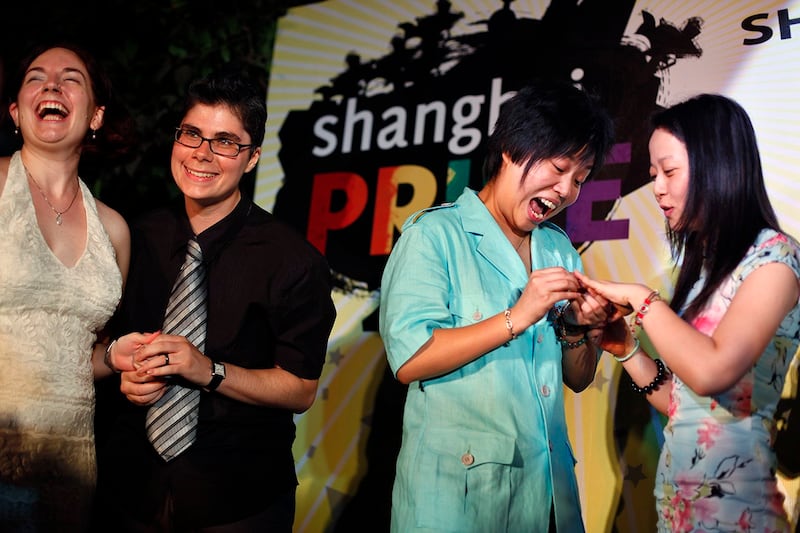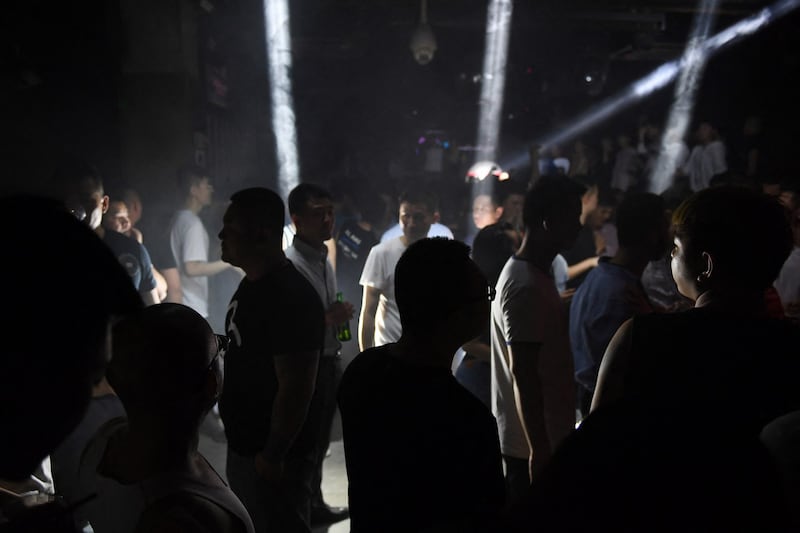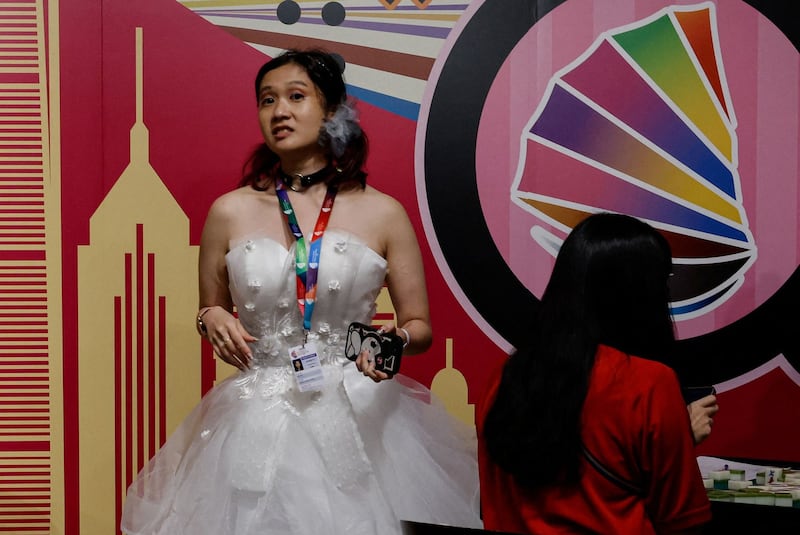This report contains references to suicide that may be disturbing to readers.
Nearly five years after democratic Taiwan legalized same-sex marriage, LGBTQ+ activism is all but extinct across the Taiwan Strait, where the ruling Chinese Communist Party under Xi Jinping has cracked down on anyone displaying the rainbow flag in public, members of China's LGBTQ+ community told Radio Free Asia in recent interviews.
On May 17, 2019, Taiwan passed historic legislation confirming a constitutional right of same-sex couples to marry, making the democratic island the first jurisdiction in the Asia region to do so and prompting a wave of weddings amid a congratulatory tweet from democratically elected president Tsai Ing-wen.
But Chinese propaganda officials warned media organizations there not to make a big deal of the story.

While major Chinese cities once had a thriving LGBTQ+ scene, a gay millennial man born in China who gave only the nickname Haohao said he has noticed a sharp decline in support or respect for the rights of sexual minorities in China, compared with just a few years ago.
"It's become pretty clear in the past few years that they don't want us to say or do anything," Haohao said, adding that gay bars and nightspots have been shutting down, while the rainbow Pride flag is basically banned in public.
"Back in the day when a lot of singers, like A-Mei or Jolin Tsai [from Taiwan] would tour China, there would always be groups of fans waving rainbow flags or wearing rainbow accessories," he said. "But that's no longer allowed -- they're not even allowed inside the venue ."
In August 2023, Chinese officials removed an LGBTQ+ anthem titled "Rainbow" by Taiwanese pop star A-Mei from her setlist from a concert earlier this month in Beijing, while security guards forced fans turning up for the gig to remove clothing and other paraphernalia bearing the rainbow symbol before going in, according to media reports.
Sherry Zhang, who goes by the stage name A-Mei, wrote the song for all of her lesbian, gay, bisexual, transexual and questioning friends, and it is frequently heard at Pride events in Taiwan. Her fans among the LGBTQ+ community often turn up and wave rainbow flags or wear rainbow clothing in a show of solidarity, confident that the song will make an appearance.
‘Very strict’ atmosphere
A month after that crackdown, authorities in the central Chinese city of Changsha removed the song "Womxnly" – which commemorates a Taiwanese teenager who was found dead in a school toilet after being bullied by classmates for his "feminine" appearance – from the setlist of Taiwanese pop star Jolin Tsai, after it became an anthem for the island's lesbian, gay, bisexual, transexual and questioning community.
"Things are very strict," Haohao said, adding that police have started harassing openly gay, bi or transgender people in public on the pretext that they are doing something illegal.
"They may not even have broken the law, but they will still be placed under coercive measures," he said.
Liu Zhaoyang, a Gen Z gay man currently studying outside China, agreed, citing the case of a volunteer at the Beijing Gay and Lesbian Center who was detained by police on their way to attend a queer event at the embassy of a European country in Beijing, and forced to sign a document agreeing to move away from the capital.

A friend of Liu's who knew the man now fears that he'll be next, as he is a known associate, Liu said.
Another non-binary friend is now in prison, after their friends tried to break him out of a "corrective school" for transgender children and young people, he said.
"They were discovered by another parent, who called the police to report them for an illegal gathering and 'fornication'," Liu said. "He has been in jail for the past couple of years -- I think he got a five-year sentence."
While homosexuality was decriminalized in China in 1997, and removed from official psychiatric diagnostic manuals in 2001, Chinese Communist Party leader Xi Jinping has ushered in a far more conservative attitude to sexuality than his predecessors, with organizers of the annual Shanghai Pride parade announcing it would end in 2020.
Activists have said the crackdown stems in part from the government's fear of civil organizations as a threat to party rule.
In July 2021, the social media platform WeChat deleted dozens of accounts belonging to LGBTQ+ groups at universities, while two lesbian students at Beijing's Tsinghua University, identified by pseudonyms Huang and Li, were disciplined in May 2022 for leaving some rainbow flags on a table in the campus supermarket with the hashtag #PRIDE. The women later filed an administrative lawsuit to complain about their treatment.
‘Ridiculous’ ruling
A friend of the women who gave only the pseudonym Su Wei said the Beijing No. 1 Intermediate People's Court had contacted the women in May 2023 and told them they wouldn't be accepting their case.
"He said the reason was an interpretation from the Supreme Court, one that ... [contains a clause] relating to national security," Su said. "The other clauses weren't applicable. It seems ridiculous."
The Beijing High People's Court also refused to accept their administrative lawsuit in June, she said.
Huang has been unable to go overseas as previously planned because of the incident, while the women have since been harassed by police for attending a memorial for a transgender friend who took their own life, Su said.

Huang has since chosen to marry a sympathetic male friend in the hope that there will be someone in her corner if she runs into further legal trouble, she said.
"If you are married, for example, your partner can hire a lawyer for you. There will be someone to help you," Su said, adding that the rainbow flag case had "made everyone realize how bad this environment is, how they're going backwards."
Wu Wei-ting, director of the Institute of Gender Research at Taiwan's Shih Hsin University, said Xi likely views LGBTQ+ issues as being the result of "Western" or "foreign" ideologies.
"The crackdown includes the party-state machinery taking the lead in attacking or discriminating against gender diversity," Wu told RFA. "So I would say it's a pretty comprehensive one."
"The whole gender diversity movement in China is finding it increasingly difficult to survive," she said.
Making life intolerable
She cited guidelines from the State Administration of Radio, Film and Television in 2021, which banned " sissy" characters from TV shows, while the authorities also banned the online sale of gender reassignment hormones in 2022, making life intolerable for trans people in China.
"Last year, there were actually several cases of transgender people choosing to commit suicide because they couldn't get hormones," Wei said.
Haohao believes that part of the backlash against queer and transgender identities has to do with the Xi administration's obsession with falling birth rates.
"Young people in China aren't really having kids nowadays," he said. "The fertility rate has dropped off a cliff, and the population is falling."
"They are trying everything to try to get people to give birth ... that's why they are suppressing [us]," he said.
Marriage rates in China are continuing to fall in spite of policies from the ruling Chinese Communist Party aimed at encouraging people to have more children amid a shrinking population, suggesting that the next generation of young people in China has other things on its mind.

Liu Zhaoyang said the crackdown seems to be focused on banning any public expression of sexual minority identities.
"They want to ban all assemblies and parades, whether they're pride parades or some form of protest against the government," Liu said. "The space we once had is getting slowly smaller, like boiling a frog in water that's still only warm."
For Haohao, the legalization of same-sex marriage by democratic Taiwan five years ago is still a distant dream.
"We can only pray that they will turn a blind eye and not interfere with us too much," he said. "That would make us very happy. We would be at peace."
Translated by Luisetta Mudie .
